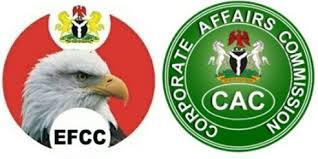Mathew Amaechi
In a decisive move to enhance Nigeria’s anti-corruption fight, the Economic and Financial Crimes Commission (EFCC) and the Corporate Affairs Commission (CAC) have deepened their collaboration to crack down on financial crimes, money laundering, and illicit business practices.The partnership, aimed at strengthening transparency and accountability in the country’s corporate sector, was reinforced during a high-level meeting between EFCC Chairman, Ola Olukoyede, and CAC Registrar-General, Hussaini Ishaq Magaji, in Abuja.
The discussions focused on data sharing, real-time access to corporate records, and joint operations targeting fraudulent entities hiding behind business registrations.Speaking on the collaboration, Olukoyede emphasized the critical role of the CAC in providing essential information that could expose shell companies and illegal financial activities. “Corruption thrives in secrecy.
By working closely with the CAC, we will dismantle networks of fraudsters and ensure that companies operating in Nigeria adhere to legal and ethical business practices,” he stated.
Magaji, on his part, reiterated CAC’s commitment to supporting the EFCC’s mandate by ensuring that corporate entities comply with statutory regulations. “The CAC’s vast database is a crucial tool in the fight against corruption. We are enhancing our systems to allow for swift identification of suspicious companies and transactions,” he said.
This renewed cooperation is expected to enhance investigations into financial crimes, streamline the process of tracking illicit funds, and ultimately strengthen Nigeria’s anti-corruption framework. It also aligns with the federal government’s broader agenda to improve the ease of doing business while maintaining strict oversight to prevent economic sabotage.
Experts have lauded the initiative, noting that tighter scrutiny of corporate registrations and financial dealings will deter individuals and organizations attempting to exploit legal loopholes for illicit gains. With corruption being a major impediment to Nigeria’s economic growth, this partnership is seen as a crucial step toward restoring investor confidence and fostering a more transparent business environment.
As the EFCC and CAC ramp up their joint efforts, Nigerians eagerly anticipate tangible results that will reinforce the country’s commitment to eradicating corruption and promoting good governance.

